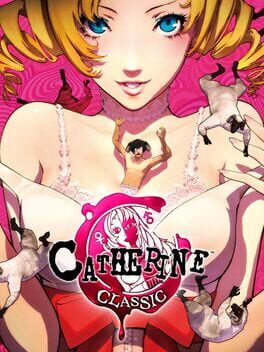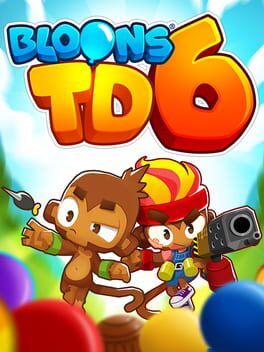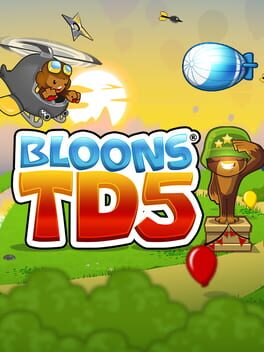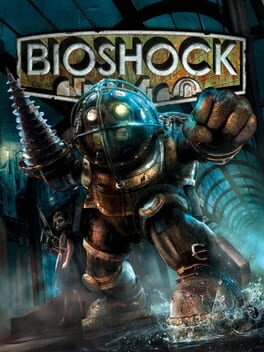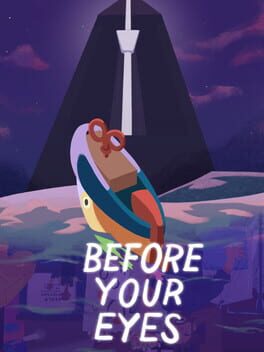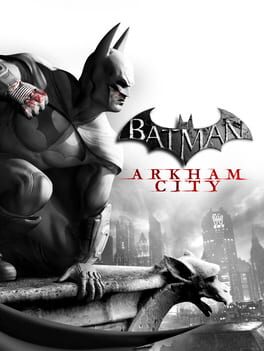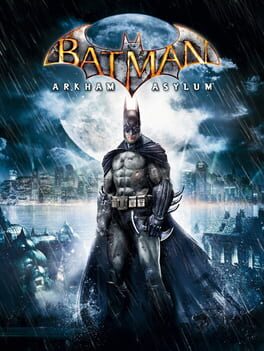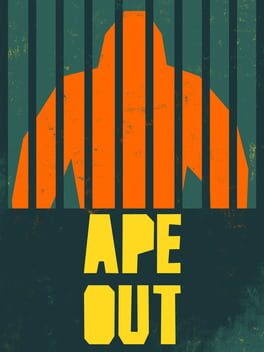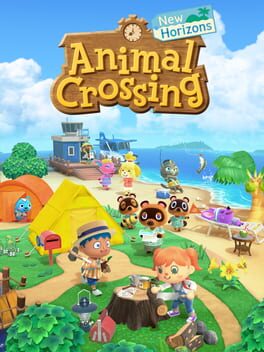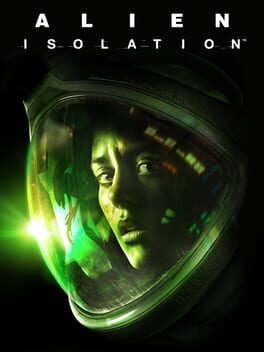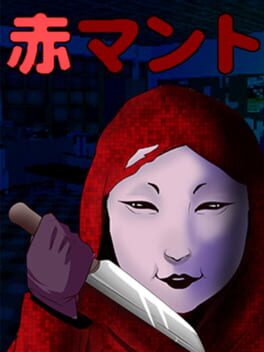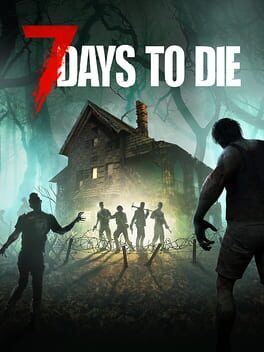W4AM
2019
2018
2011
2015
2007
I played this one back in March of 2021, around the time I got my wisdom teeth removed. I don't have anything insightful to say about this one at the moment, it's just a solid single-player shooter with an aesthetic that broke away from the typical muddy brown look of contemporary shooters. It's aged a bit, but it's definitely still playable nowadays with a bit of patience. I think it has some solid level design that keeps the player roped in, each level has a theme or gimmick that never overstays its welcome. Really strange and abrupt ending, though the body of the story is well presented.
2015
Another story based game I ought to revisit, since I last played this around July 2021. I remember immediately falling in love with the framing- playing through a few old demos created by the narrator's friend as he walks you through them and gives his two cents on their game design. I was really excited and enjoyed the conversations the game was having regarding the design choices in these games, and how a bit of the creator's personality bleeds into them. However, the narrative switches focus more on the narrator and his relationship with the person who created these demos, in which it kind of lost me. I was more interested in the conversation rather than the people.
Below is an old little tidbit I wrote right after I played it, I figured I'd put it here too.
The framing of the Beginner’s Guide is pretty interesting. You are playing through a series of simple games Davey’s friend, Coda, made between 2009 and 2011. Coda has not made a game since 2011, so Davey hopes that by publishing this collection of games and receiving player feedback, Coda will feel inspired enough to give it another shot. Davey narrates and explains each project, giving his interpretation of what he thinks Coda intended with his design decisions. It’s pretty interesting stuff, it is fun to play through Coda’s first game, move on to the second to see what themes and design choices he keeps, seeing his vision evolve. Hearing Davey give his personal opinion on what he thinks Coda meant and learned with each game was entertaining too. It felt like playing a part in a director’s commentary, except the director is absent and their overbearing friend took their place instead.
I was very interested in the first half of the game. A game talking about games, I’m a sucker for those. During a particularly restrictive and claustrophobic game, Davey shares an anecdote, an argument he had with Coda. As you are forced to get locked in a jail cell, Davey explains that the game would make you wait one whole hour in the jail cell before letting you out to explore again. He brings this up to Coda, saying it’s not very good game design, no one would wait an hour like that. Why spend all this work on creating a world that isn’t accessible. Coda wasn’t very interested in creating accessible worlds, just his own vision. This kind of conversation is interesting to me! A movie can have a director’s cut where he adds an extra 30 minutes of footage, thus completing his vision. A video game can be a little more unique, extra conditions can be added, you may not be able to get the full story unless you really engage with the game. Games like Dark Souls or Undertale that have you talk to specific people under specific conditions to unlock different storylines or endings, stuff like that is entirely unique to the medium. Does adding these strange conditions to get the full story, often inaccessible without a guide, make games better though? Personally, I looked up a guide when going through both games mentioned above. Was this the director’s vision?
It’s such a small part of The Beginner’s Guide but it’s the one I was most interested in- questions about games, their potential in storytelling, and the merit of certain design choices. To my personal disappointment, it doesn’t linger on those questions for long. Instead the focus shifts on Davey and Coda’s relationship. As the games progress, they seem to get more isolated, expressing self-doubt and maybe even loathing. Davey explains how worried he was, how it was taking longer and longer for Coda to make a new game only for it to be another simple romp through self-doubt. It’s around this time I start to get annoyed with Davey.
See, the player doesn’t know Coda, all we know about them is through Davey; they’re introverted and they make games. All of a sudden, the games get sad. It’s the way Davey talks through these games that bugs me. Coda’s games at this point feel deeply personal, like reading someone’s diary. There is dialogue that resonated with me, dialogue that read like someone talking themselves down from a rough episode of self loathing. Davey expresses how he wishes he could have helped, but he never really does. He talks about how playing these games made him uncomfortable and concerned, but never goes into detail about how he went about engaging with Coda as a friend. Davey has a habit of dehumanizing Coda through admiration. It’s evident when he talks about how they first met- Davey explains how he was overbearing when he met Coda at a game jam in 2009. He played Coda’s game and proclaimed to himself “I need to be friends with this person”. When the games get introspective, there’s a part of me that thinks what Davey really wants to say to Coda is “You’re not being weird in the right way”.
These aspects of Davey are all certainly by design. By the end of the game, he explains the last game he received from Coda contained a message at the end. The message expressed gratitude for Davey’s interest in the games, but to please never contact them again. Coda asks Davey to stop showcasing the games, and that they’re not actually depressed, just burnt out; the fact that Davey interpreted the games as having self-loathing content says more about Davey than Coda. It’s even revealed that some of the games we’d just played had actually been modified by Davey with added symbolism that wasn’t there originally. Davey goes on to solemnly explain that he wants Coda to make more games so he can feel special again. Davey essentially found validation by being associated with Coda. Hey, I’m friends with this person that makes weird games and I get to play them, aren’t I cool? When Coda stops making these, Davey stops feeling validated. He releases The Beginner’s Guide as a last ditch effort to get Coda to make games again so he can feel validated again. He can’t imagine living without validation.
The emotional climax is perfectly fine. Davey’s performance is good and I’d be lying if some of his words did not resonate with me. It’s no doubt the most memorable moment in the game, aside from the house cleaning game. However, it is the part I am least interested in, it reminded me a bit too much of a manic pixie dream girl trope; the main character being in a relationship with someone who they admire for their strange and mysterious behavior, but make little effort to engage with as a human being, only basking in the status of the relationship. To me, this is only a dramatic layer of the game. I think there may also be a layer of “suffering from success” but I don’t know the Davey guy, I can’t draw conclusions on him just from this one work (wink).
While the game doesn’t linger much on the questions of game design, it does touch on some questions regarding authorship, intent, and how we can interact with personal works. The player will inevitably draw conclusions and opinions about Coda even though we never hear a peep from them until the end of the game. Even when you know the truth between Davey and Coda, you still don’t know much about Coda. How could you? You only play through a select few games through Davey goggles, it’s like playing a game of telephone with the author’s intent. What impression could you have drawn about Coda without having Davey talk you through these games? How much can you learn about someone by only seeing what they make but never asking them a thing about it? Should we even bother to learn about the author through their work? I’m not very clever and I know little about the whole concept of “death of the author”, but I can give an opinion on Coda and their games.
Though a game is capable of telling a story in totally unique games through interactivity, it has one slight disadvantage; it’s a game. There is an expectation that it will be fun and entertaining to a degree. Digesting Coda’s work isn’t fun, they weren’t designed to be fun, they weren’t even meant to be released. Coda’s work is personal. It’s not a diary, it's an expression. It’s scribbles on paper when you’re mad, it’s screaming until your throat burns, it’s speaking every ugly thought you’ve ever had into existence so they can stop throbbing in your head. Coda’s work is a creator venting, and hearing someone vent isn’t always easy to parse.It isn’t always meant to be analyzed and peer reviewed; there isn’t always a correct way to respond, there isn’t a “win” condition. It’s about getting it out of the system. If there’s one thing Davey did right by the end of it- he got it out of his system too.
Below is an old little tidbit I wrote right after I played it, I figured I'd put it here too.
The framing of the Beginner’s Guide is pretty interesting. You are playing through a series of simple games Davey’s friend, Coda, made between 2009 and 2011. Coda has not made a game since 2011, so Davey hopes that by publishing this collection of games and receiving player feedback, Coda will feel inspired enough to give it another shot. Davey narrates and explains each project, giving his interpretation of what he thinks Coda intended with his design decisions. It’s pretty interesting stuff, it is fun to play through Coda’s first game, move on to the second to see what themes and design choices he keeps, seeing his vision evolve. Hearing Davey give his personal opinion on what he thinks Coda meant and learned with each game was entertaining too. It felt like playing a part in a director’s commentary, except the director is absent and their overbearing friend took their place instead.
I was very interested in the first half of the game. A game talking about games, I’m a sucker for those. During a particularly restrictive and claustrophobic game, Davey shares an anecdote, an argument he had with Coda. As you are forced to get locked in a jail cell, Davey explains that the game would make you wait one whole hour in the jail cell before letting you out to explore again. He brings this up to Coda, saying it’s not very good game design, no one would wait an hour like that. Why spend all this work on creating a world that isn’t accessible. Coda wasn’t very interested in creating accessible worlds, just his own vision. This kind of conversation is interesting to me! A movie can have a director’s cut where he adds an extra 30 minutes of footage, thus completing his vision. A video game can be a little more unique, extra conditions can be added, you may not be able to get the full story unless you really engage with the game. Games like Dark Souls or Undertale that have you talk to specific people under specific conditions to unlock different storylines or endings, stuff like that is entirely unique to the medium. Does adding these strange conditions to get the full story, often inaccessible without a guide, make games better though? Personally, I looked up a guide when going through both games mentioned above. Was this the director’s vision?
It’s such a small part of The Beginner’s Guide but it’s the one I was most interested in- questions about games, their potential in storytelling, and the merit of certain design choices. To my personal disappointment, it doesn’t linger on those questions for long. Instead the focus shifts on Davey and Coda’s relationship. As the games progress, they seem to get more isolated, expressing self-doubt and maybe even loathing. Davey explains how worried he was, how it was taking longer and longer for Coda to make a new game only for it to be another simple romp through self-doubt. It’s around this time I start to get annoyed with Davey.
See, the player doesn’t know Coda, all we know about them is through Davey; they’re introverted and they make games. All of a sudden, the games get sad. It’s the way Davey talks through these games that bugs me. Coda’s games at this point feel deeply personal, like reading someone’s diary. There is dialogue that resonated with me, dialogue that read like someone talking themselves down from a rough episode of self loathing. Davey expresses how he wishes he could have helped, but he never really does. He talks about how playing these games made him uncomfortable and concerned, but never goes into detail about how he went about engaging with Coda as a friend. Davey has a habit of dehumanizing Coda through admiration. It’s evident when he talks about how they first met- Davey explains how he was overbearing when he met Coda at a game jam in 2009. He played Coda’s game and proclaimed to himself “I need to be friends with this person”. When the games get introspective, there’s a part of me that thinks what Davey really wants to say to Coda is “You’re not being weird in the right way”.
These aspects of Davey are all certainly by design. By the end of the game, he explains the last game he received from Coda contained a message at the end. The message expressed gratitude for Davey’s interest in the games, but to please never contact them again. Coda asks Davey to stop showcasing the games, and that they’re not actually depressed, just burnt out; the fact that Davey interpreted the games as having self-loathing content says more about Davey than Coda. It’s even revealed that some of the games we’d just played had actually been modified by Davey with added symbolism that wasn’t there originally. Davey goes on to solemnly explain that he wants Coda to make more games so he can feel special again. Davey essentially found validation by being associated with Coda. Hey, I’m friends with this person that makes weird games and I get to play them, aren’t I cool? When Coda stops making these, Davey stops feeling validated. He releases The Beginner’s Guide as a last ditch effort to get Coda to make games again so he can feel validated again. He can’t imagine living without validation.
The emotional climax is perfectly fine. Davey’s performance is good and I’d be lying if some of his words did not resonate with me. It’s no doubt the most memorable moment in the game, aside from the house cleaning game. However, it is the part I am least interested in, it reminded me a bit too much of a manic pixie dream girl trope; the main character being in a relationship with someone who they admire for their strange and mysterious behavior, but make little effort to engage with as a human being, only basking in the status of the relationship. To me, this is only a dramatic layer of the game. I think there may also be a layer of “suffering from success” but I don’t know the Davey guy, I can’t draw conclusions on him just from this one work (wink).
While the game doesn’t linger much on the questions of game design, it does touch on some questions regarding authorship, intent, and how we can interact with personal works. The player will inevitably draw conclusions and opinions about Coda even though we never hear a peep from them until the end of the game. Even when you know the truth between Davey and Coda, you still don’t know much about Coda. How could you? You only play through a select few games through Davey goggles, it’s like playing a game of telephone with the author’s intent. What impression could you have drawn about Coda without having Davey talk you through these games? How much can you learn about someone by only seeing what they make but never asking them a thing about it? Should we even bother to learn about the author through their work? I’m not very clever and I know little about the whole concept of “death of the author”, but I can give an opinion on Coda and their games.
Though a game is capable of telling a story in totally unique games through interactivity, it has one slight disadvantage; it’s a game. There is an expectation that it will be fun and entertaining to a degree. Digesting Coda’s work isn’t fun, they weren’t designed to be fun, they weren’t even meant to be released. Coda’s work is personal. It’s not a diary, it's an expression. It’s scribbles on paper when you’re mad, it’s screaming until your throat burns, it’s speaking every ugly thought you’ve ever had into existence so they can stop throbbing in your head. Coda’s work is a creator venting, and hearing someone vent isn’t always easy to parse.It isn’t always meant to be analyzed and peer reviewed; there isn’t always a correct way to respond, there isn’t a “win” condition. It’s about getting it out of the system. If there’s one thing Davey did right by the end of it- he got it out of his system too.
2021
A totally unique storytelling experience where the game only progresses when you physically blink. This is another one I'd actually like to revisit since it's primarily story based, and I'd like to see if I get anything new from it since the last time I played it (September 2021). For right now, I actually don't have much to say about it.
Before Your Eyes is a nice romp of "what ifs"- you quite literally see your life flash before your eyes. Starting at childhood, you begin making decisions. You blink, and you see how far that decision carried you. Every time you blink time passes- it could be a few months, or a few years. The life you live is kind of a broad strokes life. It's not so much that you need to care about the life that "your character" is living through, but rather you begin connecting your own memories and relating them to the story in front of you. With such clever story presentation, it's easy to see why so many people found this game so impactful. It's one of those pieces of media whose contents may not be the most innovative, but because of the presentation and questions it asks the player, it can be something that can really stick with you, depending on how much you ruminate.
Before Your Eyes is a nice romp of "what ifs"- you quite literally see your life flash before your eyes. Starting at childhood, you begin making decisions. You blink, and you see how far that decision carried you. Every time you blink time passes- it could be a few months, or a few years. The life you live is kind of a broad strokes life. It's not so much that you need to care about the life that "your character" is living through, but rather you begin connecting your own memories and relating them to the story in front of you. With such clever story presentation, it's easy to see why so many people found this game so impactful. It's one of those pieces of media whose contents may not be the most innovative, but because of the presentation and questions it asks the player, it can be something that can really stick with you, depending on how much you ruminate.
2011
See the Arkham Asylum review. This game feels like the model sequel, where it takes all of the systems from the first game and simply expands on them. The game world is larger, the level design is expanded upon, and everything that existed in the first game is still implemented here in an equally thoughtful way.
I may revisit these Arkham games sometime soon. I played these way back around 2013 on my Xbox 360, and I have nothing but good memories regarding it. The big thing I remember thinking back then is how tight the experience felt- every action, every collectible, every gadget made sense.
The combat was satisfying and simple, with a big emphasis on building up combos. There was creative implementation of the gadgets here as well, with certain enemies requiring you to break their guard with something like a batarang or a stungun. Animation and sound quality is something that stuck with me here, everything had a very satisfying thunk to it. Stealth, too, was wonderfully implemented. There was a system in place where, the more you pick off thugs, the more panicked they become. It all felt very diegetic and satisfying.
I never was big on collectibles in games, but I think Arkham Asylum put a clever twist on these by having a majority of them actually be riddles strewn out in the world. I remember some of these being pretty clever and, again, making use of everything the player has. This actually made the collectibles feel like content rather than additional bloat or time wasters.
The voice acting and presentation was a big highlight too, they brought in all the big actors from the old animated series and they killed it. The constant night and moody atmosphere of the game really felt like peak noire Batman stuff.
Again, I'd like to revisit these games some time to see how well they hold up.
The combat was satisfying and simple, with a big emphasis on building up combos. There was creative implementation of the gadgets here as well, with certain enemies requiring you to break their guard with something like a batarang or a stungun. Animation and sound quality is something that stuck with me here, everything had a very satisfying thunk to it. Stealth, too, was wonderfully implemented. There was a system in place where, the more you pick off thugs, the more panicked they become. It all felt very diegetic and satisfying.
I never was big on collectibles in games, but I think Arkham Asylum put a clever twist on these by having a majority of them actually be riddles strewn out in the world. I remember some of these being pretty clever and, again, making use of everything the player has. This actually made the collectibles feel like content rather than additional bloat or time wasters.
The voice acting and presentation was a big highlight too, they brought in all the big actors from the old animated series and they killed it. The constant night and moody atmosphere of the game really felt like peak noire Batman stuff.
Again, I'd like to revisit these games some time to see how well they hold up.
2019
Bursting at the seams with flavor, Ape Out feels like jazz come to life. The premise is simple- you play as an ape, and you need to get out. Gameplay consists of running around and eviscerating people with your hulking gorilla strength- smashing people against walls really never gets old.
Death comes quick, heightening the game pace by encouraging player aggression. Encouraging players to play fast and loose combines well with the game's soundtrack, which consist of nothing but these intense jazzy drum beats that are capped off by snares whenever you smash a narc against the wall. The visuals are colorful and downright jarring at times- you really do feel like an animal out of control. Confused, angry, raw, this game covers it all. It's a tight experience that doesn't overstay its welcome, with the main experience taking just under two hours to complete.
If Hotline Miami's hyper violent gameplay and hypnotizing soundtrack didn't reach the intensity you desired, try Ape Out. The thumping footsteps, crushing snares, and constant drum beat that you can feel in your chest will give you a rush, if only for a bit.
Death comes quick, heightening the game pace by encouraging player aggression. Encouraging players to play fast and loose combines well with the game's soundtrack, which consist of nothing but these intense jazzy drum beats that are capped off by snares whenever you smash a narc against the wall. The visuals are colorful and downright jarring at times- you really do feel like an animal out of control. Confused, angry, raw, this game covers it all. It's a tight experience that doesn't overstay its welcome, with the main experience taking just under two hours to complete.
If Hotline Miami's hyper violent gameplay and hypnotizing soundtrack didn't reach the intensity you desired, try Ape Out. The thumping footsteps, crushing snares, and constant drum beat that you can feel in your chest will give you a rush, if only for a bit.
My first Animal Crossing game, I found New Horizons to be a totally charming game. I think the first week or so of introduction the game has introduces all the game systems like crafting, collecting, and exploring islands well. The real meat of the game comes from personal player experience, this is essentially a sandbox for decorating your home and island.
Personally, I've always been directionless with these kinds of games. I'm not terribly creative when it comes to aesthetics, so I didn't actually spend too much time terraforming my island to be ideal. This, combined with the fact that I was always short on bells to buy all the furniture I wanted, led me to appreciate the game more in a sense of environment. I was more interested in the daily minutiae of collecting bugs and fish, talking to neighbors, and seeing what all happens in day to day life. Unfortunately after a few hours, it becomes pretty evident that villagers are a bit of a backdrop, with personalities that more or less blend together. I don't find it terribly surprising- there are over 400 villagers so giving each of them a handcrafter personality feels like a tall order. Still, it left me wishing that there was more dialogue, or some more smoke and mirrors to make it seem like they were more independent and living in the world.
One of the design pillars of Animal Crossing seems to be in the quiet, daily life. The players make their own stories through their experiences and interactions, and there is a sense of comfort in the routine of daily tasks. However, the interactions did feel a bit lacking. From what I've seen from previous games, they definitely knocked it out of the park when it came to home decoration. Overall I have very positive opinions of the game but I doubt I'll ever get into it enough to put together the island of my dreams.
Personally, I've always been directionless with these kinds of games. I'm not terribly creative when it comes to aesthetics, so I didn't actually spend too much time terraforming my island to be ideal. This, combined with the fact that I was always short on bells to buy all the furniture I wanted, led me to appreciate the game more in a sense of environment. I was more interested in the daily minutiae of collecting bugs and fish, talking to neighbors, and seeing what all happens in day to day life. Unfortunately after a few hours, it becomes pretty evident that villagers are a bit of a backdrop, with personalities that more or less blend together. I don't find it terribly surprising- there are over 400 villagers so giving each of them a handcrafter personality feels like a tall order. Still, it left me wishing that there was more dialogue, or some more smoke and mirrors to make it seem like they were more independent and living in the world.
One of the design pillars of Animal Crossing seems to be in the quiet, daily life. The players make their own stories through their experiences and interactions, and there is a sense of comfort in the routine of daily tasks. However, the interactions did feel a bit lacking. From what I've seen from previous games, they definitely knocked it out of the park when it came to home decoration. Overall I have very positive opinions of the game but I doubt I'll ever get into it enough to put together the island of my dreams.
1986
It was a very quaint experience to play an adventure game like this. One of the first of its kind, the Legend of Zelda speaks a language of game design that is still understood to this day. At a time where video games were little more than little high score competitions or linear adventures, it is interesting to see the approach taken to an open world game in 1986.
The result is an adventure that still holds up to this day. A shining pillar of this game is its exploration- the clear cut message to the player that is communicated from the very first area. You go into a cave and are rewarded with your first sword. Where do I even go from here? As far as the sword can take you. What I find brilliant for a game of this age is that it communicates direction through its enemies and player capability. In the immediate areas next to the start are enemies that die easily to your sword, usually in one hit. Venture out further and you'll begin to find more menacing foes that can end your journey in seconds.
So exploration is encourage, but enemies are tough if I explore a certain direction? Go another direction! It's a game that is at conversation with its player, giving suggestions but never outright directions. This is the essence of an adventure- picking a direction and sticking with it, not knowing what lies ahead. This gives the environment itself so much more personality too. I didn't have a guide on me, so I wasn't sure what all these enemies or areas were officially called, but I started giving them my own names. To me, Gibdo's were mummies, Keese were bats, Goriyas were goblins. Ascribing names to enemies and places you've never seen before also feeds a personal sense of connection to the player journey. When everything that lies ahead is a mystery, every discovery feels deeply personal.
If the outside world was dangerous, then the dungeons were outright hostile. These are were players are really asked to consider everything they've stumbled upon in the game and apply it. I, through no guide, stumbled upon a secret in the very first dungeon where I pushed a block to get access to a stairwell. I hadn't seen that pushing blocks was possible before, but I couldn't help but feel a nagging feeling at this empty room. Likewise, I ended up finding a secret stairwell again in the overworld after attacking a statue totally by accident. From there I was pushing and poking every block, statue and wall to see if I could find anything else. Finding secrets like these truly invoked a childlike sense of wonder. Again, the word of the day is adventure, and having players experience finding secrets like these does so much for that sense.
Overall, it is a total joy to experience this kind of progenitor of a game. The Legend of Zelda has solid game design choices based around exploration and it hardly breaks its own design rules.
The only real critique I can imagine is the usual mentioning of the ball-busting difficulty and some more abstract secrets, but I find those to charmingly be a product of the time. I imagine kids sharing secrets they found with one another back then, spreading rumors, back when you couldn't look the information up in a matter of seconds. Overall, if you've thought about playing this game to see what your dad was talking about, I'd say give it a go, you might be surprised to how well you take to it.
The result is an adventure that still holds up to this day. A shining pillar of this game is its exploration- the clear cut message to the player that is communicated from the very first area. You go into a cave and are rewarded with your first sword. Where do I even go from here? As far as the sword can take you. What I find brilliant for a game of this age is that it communicates direction through its enemies and player capability. In the immediate areas next to the start are enemies that die easily to your sword, usually in one hit. Venture out further and you'll begin to find more menacing foes that can end your journey in seconds.
So exploration is encourage, but enemies are tough if I explore a certain direction? Go another direction! It's a game that is at conversation with its player, giving suggestions but never outright directions. This is the essence of an adventure- picking a direction and sticking with it, not knowing what lies ahead. This gives the environment itself so much more personality too. I didn't have a guide on me, so I wasn't sure what all these enemies or areas were officially called, but I started giving them my own names. To me, Gibdo's were mummies, Keese were bats, Goriyas were goblins. Ascribing names to enemies and places you've never seen before also feeds a personal sense of connection to the player journey. When everything that lies ahead is a mystery, every discovery feels deeply personal.
If the outside world was dangerous, then the dungeons were outright hostile. These are were players are really asked to consider everything they've stumbled upon in the game and apply it. I, through no guide, stumbled upon a secret in the very first dungeon where I pushed a block to get access to a stairwell. I hadn't seen that pushing blocks was possible before, but I couldn't help but feel a nagging feeling at this empty room. Likewise, I ended up finding a secret stairwell again in the overworld after attacking a statue totally by accident. From there I was pushing and poking every block, statue and wall to see if I could find anything else. Finding secrets like these truly invoked a childlike sense of wonder. Again, the word of the day is adventure, and having players experience finding secrets like these does so much for that sense.
Overall, it is a total joy to experience this kind of progenitor of a game. The Legend of Zelda has solid game design choices based around exploration and it hardly breaks its own design rules.
The only real critique I can imagine is the usual mentioning of the ball-busting difficulty and some more abstract secrets, but I find those to charmingly be a product of the time. I imagine kids sharing secrets they found with one another back then, spreading rumors, back when you couldn't look the information up in a matter of seconds. Overall, if you've thought about playing this game to see what your dad was talking about, I'd say give it a go, you might be surprised to how well you take to it.
2014
A masterclass in horror games, a solid game that maintains its tension throughout its entire campaign. The visual aesthetics are superb, the environments don't just feel like corridors to avoid enemies- they feel alive and lived-in, with evidence of evil aliens and ghouls running around. The entire map breathes with detail, it is a joy to explore, I am a sucker for the retro-future look. Lots of player options to avoid the Alien and her army of killer robots that keep the game moving without taking away horror elements. The only downside I can think of is that it could have been a few hours shorter to maintain its pace, but otherwise it's a must have for boys and girls in for a scare.
2019
Good visual aesthetics and very claustrophobic, but nothing to write home about if you're looking for a horror game that sticks with you, as the gameplay loop and the horror used is nothing special. It's a first person game where you avoid a killer in a school, you get what you sign up for. Not a bad choice to get some friends to scream at the game together.
2013
A solid multiplayer experience with friends, a solid addition for shmucks that like zombie survival games.
This is one of the survivalcraft games I care about building in since there is a concise focus on why you're building. I'm not very creative when it comes to building things in these kinds of games, I can count the number of "pretty" houses I've built in Minecraft in like, two hands. But in 7 Days to Die, it feeds the childlike fantasy of "how would I kill one million zombies with my house".
There is a good gameplay loop of gathering resources, building, and fending off the 7th day horde. Every day leading up to the 7th day feels like a ticking clock, and a lot of the player decision hinges on the incoming 7th day. Which building has the least holes in it that we can defend? Should I invest skills in weapons or improving basebuilding? How am I going to sustain myself with food and water? With the myriad of difficulty options, these experiences can be as intense or as relaxed as you want them to be.
The key word here is "with friends". I've tried a couple of solo runs and the game is definitely not designed for that, even with the experience gain and difficulty tweaked a bit. I definitely get a lot more enjoyment seeing a group of friends each fitting into their own role of building, looting, or farming to prepare for an incoming horde.
Unfortunately, like many survivalcraft games, there comes a point where you gather so much that there's little point in going on. The zombie AI always targets the weakest blocks in a building to get to players, which can make elaborate defense setups feel pointless- for players that only care about surviving, it's best to look up optimal base setups rather than make a dream house surrounded by spike traps and escape routes, which kinda takes you out of the whole experience. General aesthetic and jank is also something to get used to going into the game. Not a bad way to spend time with friends though, I'm a fan of coop experiences where people do have to work together to make things work, rather than just playing the same game but side by side.
This is one of the survivalcraft games I care about building in since there is a concise focus on why you're building. I'm not very creative when it comes to building things in these kinds of games, I can count the number of "pretty" houses I've built in Minecraft in like, two hands. But in 7 Days to Die, it feeds the childlike fantasy of "how would I kill one million zombies with my house".
There is a good gameplay loop of gathering resources, building, and fending off the 7th day horde. Every day leading up to the 7th day feels like a ticking clock, and a lot of the player decision hinges on the incoming 7th day. Which building has the least holes in it that we can defend? Should I invest skills in weapons or improving basebuilding? How am I going to sustain myself with food and water? With the myriad of difficulty options, these experiences can be as intense or as relaxed as you want them to be.
The key word here is "with friends". I've tried a couple of solo runs and the game is definitely not designed for that, even with the experience gain and difficulty tweaked a bit. I definitely get a lot more enjoyment seeing a group of friends each fitting into their own role of building, looting, or farming to prepare for an incoming horde.
Unfortunately, like many survivalcraft games, there comes a point where you gather so much that there's little point in going on. The zombie AI always targets the weakest blocks in a building to get to players, which can make elaborate defense setups feel pointless- for players that only care about surviving, it's best to look up optimal base setups rather than make a dream house surrounded by spike traps and escape routes, which kinda takes you out of the whole experience. General aesthetic and jank is also something to get used to going into the game. Not a bad way to spend time with friends though, I'm a fan of coop experiences where people do have to work together to make things work, rather than just playing the same game but side by side.
